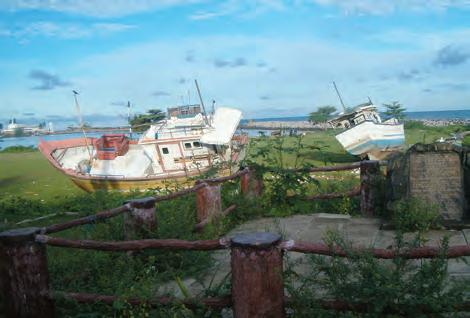
3 minute read
A devastating tsunami
from Engleski 1
52 ADDITIONAL READING
After reading the text, discuss the questions.
Advertisement
1. What is a tsunami? 2. How does it threaten the Earth? 3. What happened to the countries around the Indian
Ocean in 2004? 4. Can people do anything to prevent a tsunami-related disaster?
A tsunami is a series of destructive waves created by earthquakes, mass movements above or below water, volcanic eruptions and other underwater explosions, such as testing nuclear weapons at sea. It can travel great distances and can flood coastal areas thousands of miles from their source. Tsunamis occur most frequently in the Pacific Ocean, but they are a global phenomenon. Japan is the nation with the most recorded tsunamis in the world. On December 26, 2004, an undersea earthquake measuring 9.3 on the Richter scale occurred 160 km off the western coast of Sumatra, Indonesia. It was the second largest earthquake in recorded history. It caused serious damage and deaths as far as the east coast of Africa, leaving about 230,000 people dead in the countries around the Indian Ocean. In addition to the large number of local residents, up to 9,000 foreign tourists (mostly Europeans) enjoying the peak holiday travel season were among the dead or missing, especially people from the Nordic countries. On March 11, 2011, Japan’s most powerful earthquake since records began struck the north-east coast, triggering a massive tsunami. Cars, ships and buildings were swept away by a 10 metre high wave. Four trains were missing along the coast. Thousands of people living near the Fukushima nuclear power plant were ordered to evacuate. Some 1,800 homes were destroyed in that area. The tsunami rolled across the Pacific at 800km/h - as fast as a jetliner - before hitting Hawaii and the US West Coast, but there were no reports of major damage from those regions.
WARNINGS AND PREVENTION

Tsunamis cannot be prevented or precisely predicted, but there are some warning signs of a coming tsunami, and many systems have been developed and are in use to reduce the damage from tsunamis. Certain large animals (e.g. elephants) heard the sounds of the tsunami as it approached the coast of Sri Lanka. The elephants’ reaction was to go in the opposite direction to the noise, and they went inland.
VOCABULARY
a cb
1 Choose the synonymous word/phrase (a or b) which can replace the underlined word in the sentence. 1. Her writing has little impact on writers abroad. a. criticism b. effect 2. He went to Africa to hunt because he wanted to get a thrill out of it. a. have some excitement b. experience danger 3. He decided to do some research into Serbian literature. a. investigate b. get some information on 4. She managed to set aside some money for her son’s education. a. save b. collect 5. She spent her entire career teaching small children. a. enormous b. whole 6. Is this exercise appropriate for students of that age? a. reserved b. suitable 7. Did the scientists forecast great disaster? a. predict b. prove 8. After his graduation he set up a small company which made animated films. a. developed b. founded 9. I am amazed by the beauty of these vases. a. excited b. surprised
GRAMMAR
2 Complete these sentences using the correct tense of the verbs in brackets.
1. ‘The clock is slow.’ ‘It isn’t slow, it __________________.’(stop) 2. I can’t go out because I __________________my work. (not/finish) 3. You _______________ me yet who your favourite writer is. (not/tell) 4. ________ you ________ my best friend before? (meet) 5. She _________________ all the books by Andrić. (read) 6. Jim ________________which book to read first. (not/decide)
7. He ___________ (buy) a new TV last year, but he ______________ the old one yet. (not/sell) 8. I promise I _____________ (tidy) my room later.
9. I ___________________ (take) my guests to the theatre tomorrow.
I’ve already bought the tickets. 10. _____ you ______ make a cake for the project last week? (must)
KEY WORD LIST
Nouns
thrill research summary boredom impact threat
Adjectives
rotating amazed likely intense appropriate entire
Verbs
reveal chase forecast target seek sweep monitor
Phrasal verbs
set off set out set up set something aside
Expressions
wipe out thrill-seeker in advance






